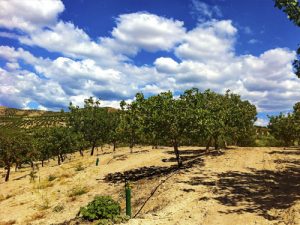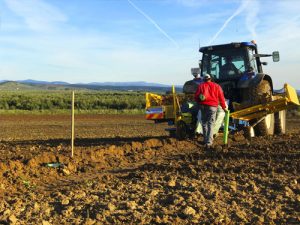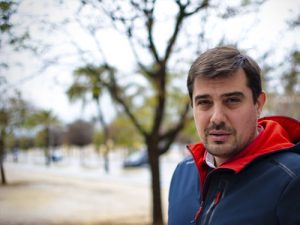Pistachio cultivation is relatively new in Spain, in spite of the existing training programs, it requires an exchange of experiences among farmers who wish to produce an unfamiliar crop. This case study will examine how to learn from the experiences of farmers and how to create positive information flows amongst farmers who share a similar interest.
Basic information
The farmers are located in the provinces of Ciudad Real, Granada and Jaén and are dedicated to the production of pistachios, a relatively new crop in Spain. Therefore, there is little experience and knowledge about its production. Pistachio is a profitable crop, but it requires significant investment - a longer term of return of investment than other permanent crops. There has to be a careful selection of the specific variety of pistachio to be cultivated on an individual farm as it is a sensitive crop to soil fertility and climatic conditions. The crop also needs to be grafted and cross pollinated. All of these variables generates a degree of uncertainty about its viability, especially when there is a lack of theoretical information, with few publications in Spanish. Therefore, the cultivation of pistachios has become an ‘adventure’ for farmers who planted this crop.
The cultivation of pistachios in Spain is a relatively recent phenomenon. Information about its cultivation can be ob- tained from a research center called “El Chaparrillo”, where official courses are held. The need to go beyond the train- ing obtained and the need to find encouragement, has forced this group of farmers to support each other, exchanging information experiences and services, thereby mitigating the difficulties of cultivating a relatively new crop in Spain. The consortium consists of 10 farmers from Ciudad Real, Granada and Jaén., in addition to giving each other personal support, knowledge has been consolidated by the farmers and experiences have been shared with each other. This has led to a reduction in costs for many of the groups participants, along with an increase in production.
This has generated personal satisfaction amongst the farmers and this is ‘based on trust, generosity and the willing- ness to learn from each other’. From this interaction, informal knowledge has been generated and it flows between the members of the group.
An informal network like this, can only be maintained if there are personal relationships and trust among its mem- bers. For this reason, it requires a continuous effort on the part of the members to meet and maintain contacts. The distance can endanger the relationship.
Only if there is trust, the farmer will be willing to share his / her experiences. The lack of formalization with respect to knowledge formation, creates difficulties with respect to dissemination activities beyond the group as it deemed to be anecdotal rather than scientific.
When the management of a crop is complex and there is uncertainty, the sense of belonging to groups of farmers can offer high-valued support, both technical and psychological.
It is important to recognize what each farmer can contribute to the group and take responsibility for the develop- ment of that part of knowledge.
In any case, it is recommended to formalize the generated knowledge, so that it can be used outside the group and adjusted over time. Include someone with a technical profile.
Open communication, generation of trust, generosity, and the continuous effort to be in contact are important fac- tors for the generation of knowledge networks.
Leadership skills and the ability to communicate concepts clearly are important for effective information dissemina- tion. Leadership is fundamental, someone within networks and sub-networks has to assume the role of enabler, so that groups work effectively and information flows efficiently. The ability to communicate concepts is important, so the information comes clearly and accurately to its members.
Generosity is fundamental, sometimes in meetings you contribute more than what you put in, but in the medium term opportunities always arise.
The management of information, the usage of communication media technology to manage and deposit information, can be useful for the management of a group like this.
Advice/Recommendation
"Capabilities to build trust through empathy and kindness are essential to establish permanent personal relationships in informal groups."
Queries/Questions
- Since 2010, the farmers of this group have been exchanging experiences and build- ing knowledge from different locations. Do you think you could maintain such an initiative amongst your colleagues?
- Is it possible to manage this form of informal cooperation without structures, rules or budgets?
- Do you think creating a group to generate knowledge and exchange experiences and services can be adjusted to your production? In which crop or in what areas of knowledge could you organize a group of this type?
- What forms of communication would you use and how would you manage the knowl- edge generated within the group, so that it would be accessible to new entrants?



 Čeština
Čeština  English
English  Français
Français  Deutsch
Deutsch  Italiano
Italiano  Slovenščina
Slovenščina  Español
Español 




